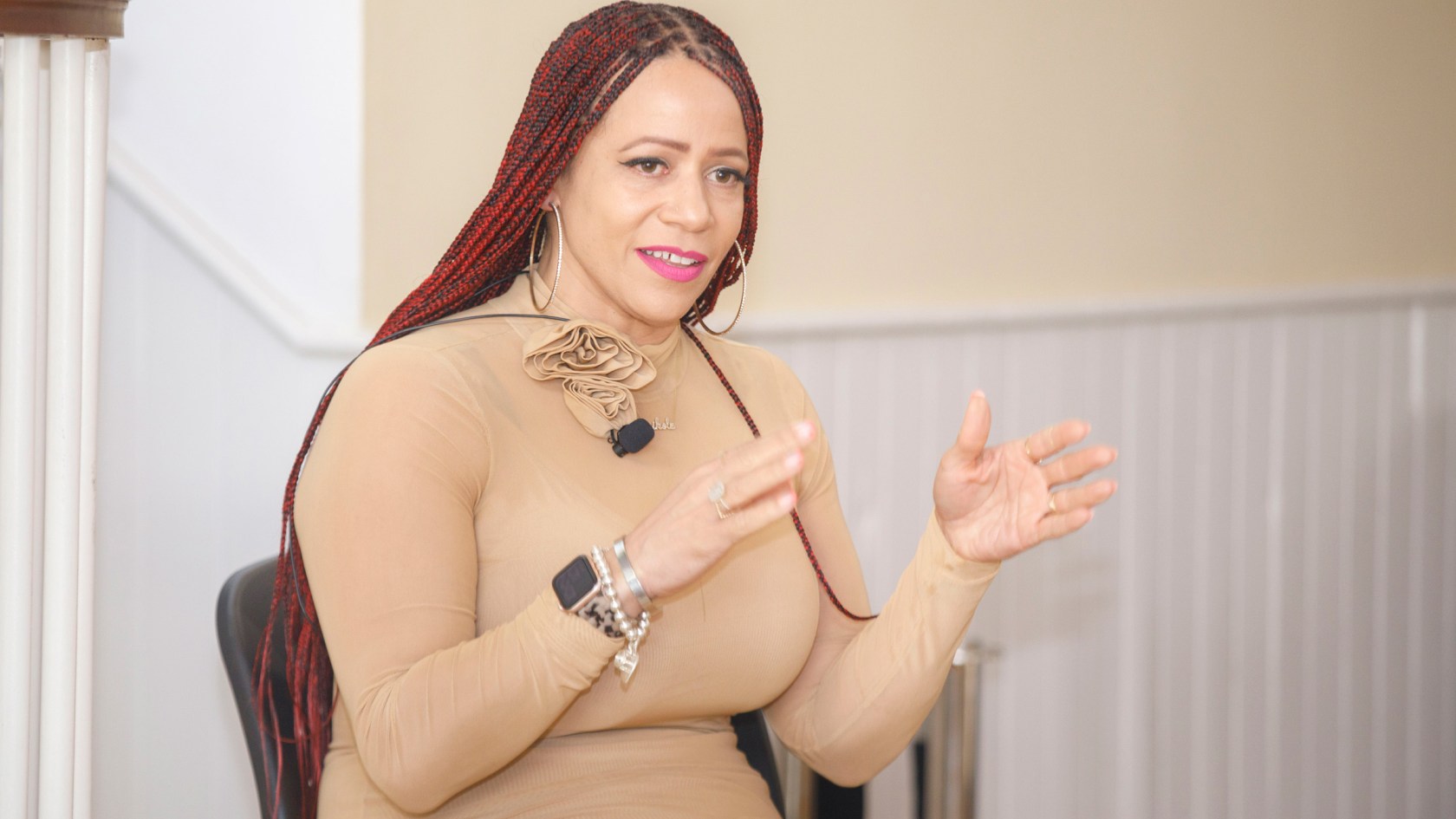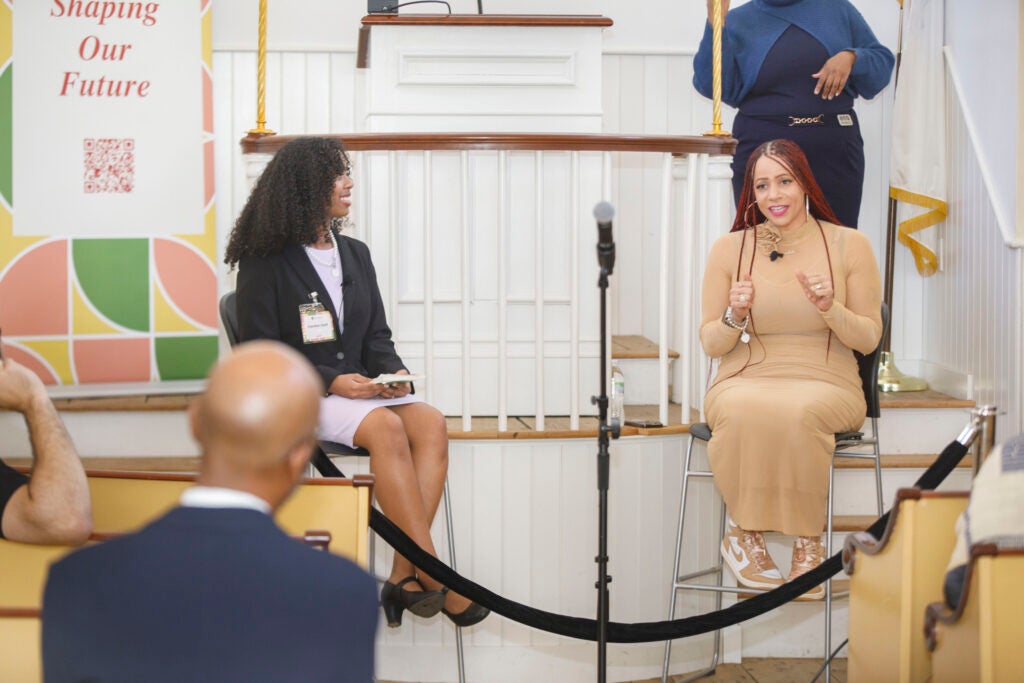
Keynote speaker Nikole Hannah-Jones.
Photos by Kris Snibbe/Harvard Staff Photographer
Nikole Hannah-Jones on history, rage — and hope
Pulitzer Prize winner delivers keynote at Harvard & the Legacy of Slavery Initiative’s 2024 Symposium
Nikole Hannah-Jones was 11 the first time she wrote a letter to the editor.
She regularly read the paper in her hometown of Waterloo, Iowa, with her father and was struck by how Black people only appeared there in stories about crime. So when Jesse Jackson ran for president and did poorly in her state, she decided to write about how it made her feel.
When her letter was published, she said, it was one of the first times she experienced the power of the written word and how journalism could be used as a tool for “telling our own stories.”
“I could see something that I thought was unjust in the world, and I could write something about it,” said the Pulitzer Prize-winning journalist in her keynote address at “Reckoning with History, Shaping Our Future,” the Harvard & the Legacy of Slavery Initiative’s 2024 Symposium. “I couldn’t change it, but I could at least force people to think about it, to grapple with it.”
As an investigative journalist, Hannah-Jones has devoted her career to highlighting racial injustice around her, a notable example being her award-winning “The 1619 Project,” which reframes American history, placing slavery at the center of the nation’s development and examining how its legacy continues to shape lives today.
Nikole Hannah-Jones
“That’s when I started to understand that what they’re calling history is not actually what happened.”
The year 1619 had been on Hannah-Jones’ radar since she was 15. She said that as a young person, she noticed how few Black figures emerged in her history class and assumed there must be a good reason for that. But when she took a semester-long class on African American history, she learned “more about Black people’s contributions, not just to the United States but globally, than I learned my entire life.” It was transformative.
“That’s when I started to understand that what they’re calling history is not actually what happened,” she said. Her teacher introduced her to the book “Before the Mayflower,” in which she was introduced to The White Lion, an English ship that brought the first enslaved Africans to the U.S. in 1619, well before the Mayflower arrived. “As a journalist, I [always felt] like I was working my way slowly back to 1619,” she told the audience. “[Slavery] would corrupt and corrode and shape everything about the United States.”
Hannah-Jones, who writes for The New York Times Magazine, spoke on the first day of the two-day event at the African Meeting House in Boston, the oldest existing Black church building in the country and part of the Museum of African American History. She was joined in conversation by Kiersten Hash, a junior at the College.
Hannah-Jones pitched her project to The Times when she realized the 400-year anniversary of slavery was approaching. One reason was that she wanted to help people understand the country we live in today and why inequity is so pervasive. But her other reason was that she wanted to answer the question that “every Black person” gets at least once in their life: Slavery was a long time ago, so why can’t you just get over it?
“I was like, ‘I’m going to provide the answer to that, which is we can’t get over it because y’all haven’t gotten over it,’” she said. “We have refused to be truthful about slavery and how it has shaped our society.”

But, she noted, that is only the beginning — a necessary step but not a whole resolution.
“We have to start with the truth-telling, but the truth-telling is just the beginning. No reckoning has occurred. We’re not even close,” Hannah-Jones said. An incredible amount of work still needs to be done, including financial compensation to descendants, investment in communities affected, and further efforts to repair the harm “that cannot be fixed.”
She asked the event organizers to share information about what Harvard has committed to doing, including through a $100 million fund to advance the recommendations from the Presidential Committee; the recommendations serve as a reckoning of Harvard’s own legacy of slavery. Examples of Harvard’s investments in repair work with descendant communities include the Du Bois Scholars Program, an intensive, nine-week summer research internship at Harvard College for students from historically Black colleges and universities, and the Reparative Partnership Grant Program, which is meant for community organizations to advance “innovative and impactful projects that address systemic inequities affecting people who have been harmed by slavery.”
A major reason Hannah-Jones focuses so adamantly on financial compensation is because it seems like “we want to do everything but that.” She reminded the audience that slavery was an economic decision; racism was simply a tool used to justify the act of buying and enslaving people. And as slavery was an economic decision, it requires economic repair.
“We understand in every other aspect of life, if you do something to me, then you have to pay me for that harm,” she said, advocating that even more resources should be going toward descendant communities. “[If you’re] not talking about cash payment, you’re not actually talking about repair.”
Toward the end of the event, Hannah-Jones shared a bit about what motivated her to do this work.
“Rage,” she said, which elicited laughs from the audience.
She went on to say there is much that makes her feel hopeless, but she feels her work pays back a debt to her family and her collective ancestors, and paves the way for generations to come. And change is possible.
“If you know that we chose it, you know we can build something else,” she said.




